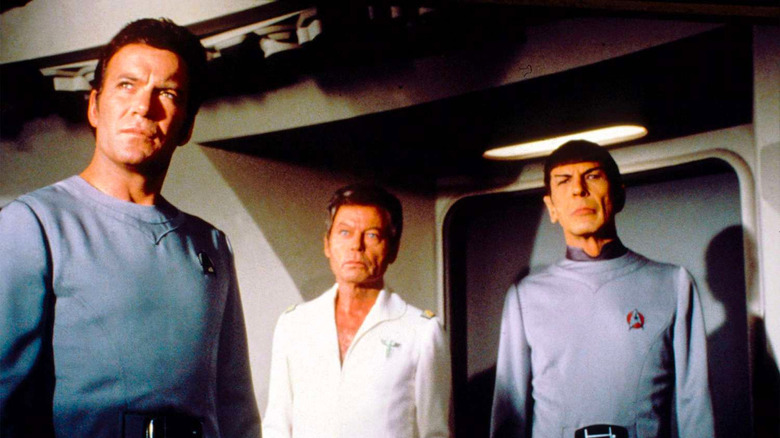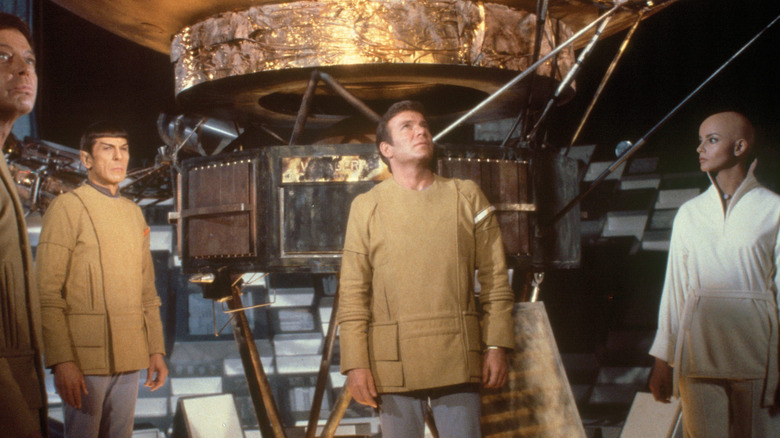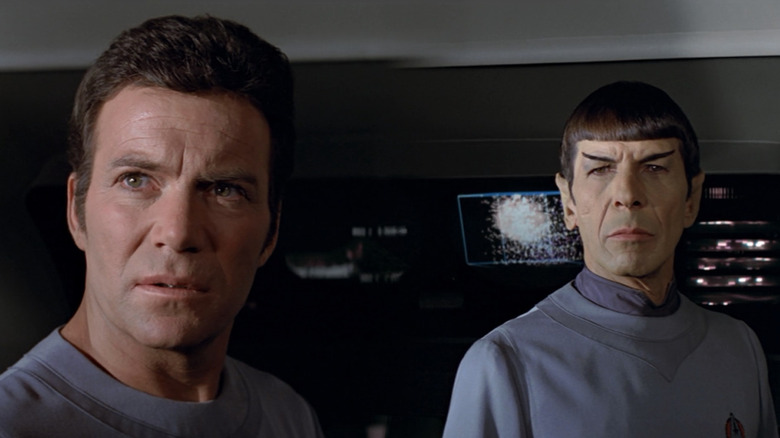Why Paramount Sent Gene Roddenberry Away For Star Trek: The Motion Picture
The background is well-known to Trekkies. Throughout the 1970s, "Star Trek" exploded in popularity. This was thanks largely to some sweet eternal syndication deals, which allowed the series to stay on the air pretty much in perpetuity. In the mid-'70s, "Star Trek" conventions were born, revealing to the world that there was a passionate, ultra-nerdy contingency of Trek fans willing to discuss and celebrate their pop obsession in public. It was at these conventions that series creator Gene Roddenberry opened an ongoing conversation with Trekkies as to what made his series so appealing. One could argue that it wasn't until these conversations that Roddenberry discovered the depth of his show, and the pragmatic philosophies of pacifism and diplomacy it represented.
It was in 1975 that Roddenberry began working on a "Star Trek" movie, although that early concept fell apart over some complex script issues. After that, Roddenberry began work on "Star Trek: Phase II," a spinoff of the original series that was to feature the original cast ... and some new potential replacements.
Thanks to the boffo success of Steven Spielberg's "Close Encounters of the Third Kind," however, "Phase II" was scrapped in favor of a newly rekindled "Star Trek" movie project, eventually to be called "Star Trek: The Motion Picture." It was to be an outsize space epic that finally expanded the rinky-dink adventures of the 1966 RV series to a massive, cinematic scale.
Roddenberry served as a producer on "The Motion Picture," and it was a famously troubled production. Indeed, Roddenberry proved to be such a control freak that the studio sent him away on a vacation just to get him out of their hair. This was according to "The Motion Picture" VFX head Douglas Trumbull in a 2019 interview with TrekMovie.
Very very difficult
Paramount hired Douglas Trumbull as he had already, by 1979, put together some of the most amazing visual effects that cinemas had ever seen. Not only did he create sequences for "Close Encounters of the Third Kind," but was a major contributor to "2001: A Space Odyssey." He would go on to work on "Blade Runner" and "The Tree of Life" in addition to directing the films "Silent Running" and "Mindwarp."
When talking to TrekMovie, Trumbull admitted that he never spoke to Roddenberry. It was his project and Roddenberry served as a producer, but it seems that he was removed from production early on to let everyone do their thing. Trumbull said:
"I had no contact with him. That was kind of an interesting back story. I don't know if anybody knows this story, but Gene was, I was told by the studio, a very, very difficult man to get along with. And in order to progress on the movie production, even before I came on board, Paramount just arranged to put Gene on a kind of a lush vacation cruise someplace. I don't know anything more about it than that."
Some Trekkies may also be able to tell you that the post-production on "The Motion Picture" was a mess, with the original effects supervisor, Robert Abel, fired after wasting a year and millions of dollars on un-useable shots. Trumbull was brought in at the last minute, given a massive, massive budget, and proceeded to make some of the most impressive effects that "Star Trek" had ever seen. "[I]n my experience," he said, "the Star Trek movie was the most troubled production I had ever encountered."
To this day, some of the visuals in "Motion Picture" haven't been surpassed by other entries in the franchise.
Where was Gene?
Gene Roddenberry did indeed take a vacation after shooting on "The Motion Picture" wrapped, but that was, by the timeline of events, meant to be a "break time" before post-production began in earnest. It seems that it might have been during this vacation that Trumbull took over VFX duties. I suppose it might be contested whether or not Paramount sent Roddenberry away or if Roddenberry was merely out of town on his own volition.
Regardless, Roddenberry insisted on making a lot of creative decisions about "Star Trek," some of which likely angered the Paramount higher-ups. Roddenberry was notorious for being a control freak, as well as taking credit for other people's ideas. It's not hard to disbelieve Trumbull's assertion that Roddenberry was difficult to get along with.
When "Star Trek: The Motion Picture" wasn't the overwhelmingly massive hit that Paramount wanted, he was, in the words of William Shatner, "kicked upstairs." Shatner wrote as much in his book "Star Trek Movie Memories." Roddenberry was, after 1979, only permitted to serve as a distant executive producer and a creative consultant — largely only a title on paper — on any sequels. Paramount proceeded to make three hit "Star Trek" sequels from 1982 to 1986 without Roddenberry's direct input. He didn't like them.
But the Great Bird of the Galaxy would eventually re-assert control over the franchise in 1987 with the launch of "Star Trek: The Next Generation." Now Trek was going to be more diplomatic than ever, dammit. Roddenberry was also reportedly very difficult to work with on "NextGen" as well, but at least his baby was his again.


